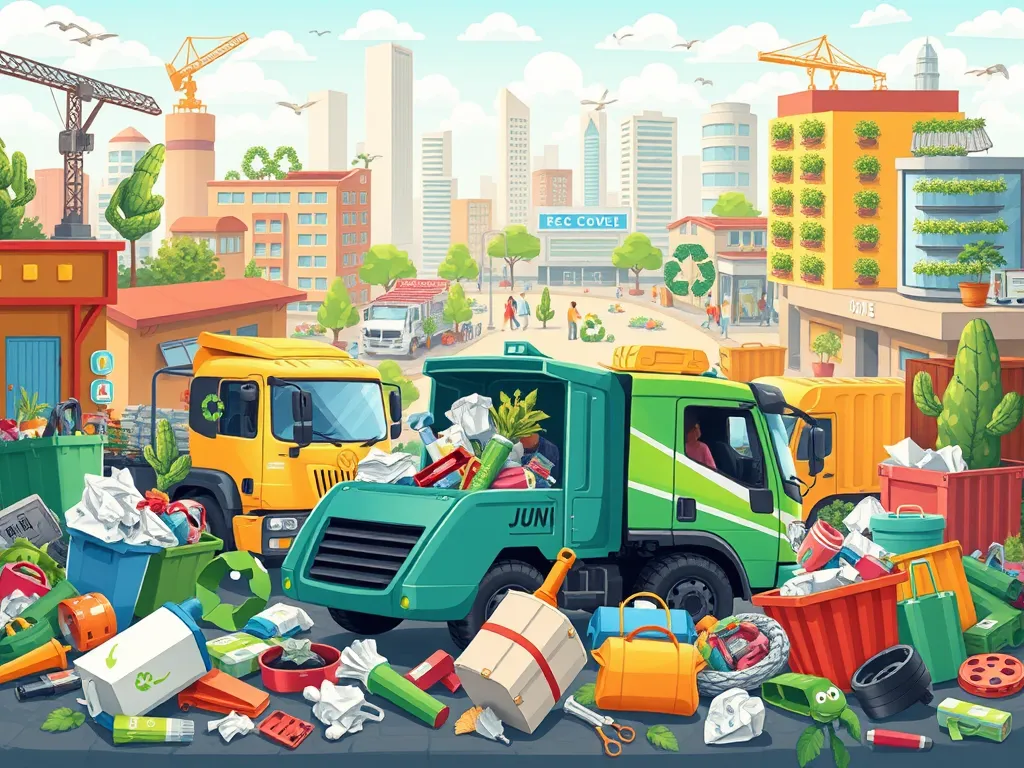Exploring Emerging Trends in the Junk Removal Industry

Understanding the Junk Removal Industry: A Comprehensive Overview
The Junk Removal Industry has evolved significantly over the years, addressing a growing need for efficient waste disposal and management solutions. As urban areas expand and households accumulate unwanted items, the demand for professional junk removal services has surged, making this industry a vital component of environmental sustainability and community wellness.
The latest insights into sustainable practices can be found at https://www.nrep.org/blog/waste-management-trends, highlighting innovative waste management trends.
In recent times, the Junk Removal Industry has also adopted eco-friendly practices, prioritizing recycling and responsible waste disposal. With increasing awareness regarding environmental issues, both consumers and companies within the industry are focusing their efforts on minimizing landfill contributions and promoting sustainable alternatives. This influential shift has led to the development of various initiatives that bolster the importance of eco-conscious services.
Technology has played a crucial role in the evolution of the Junk Removal Industry. By integrating modern technological advancements, companies can offer effective and user-friendly services. Apps for booking junk removal and tracking progress have made it easier for customers to manage clutter and receive timely assistance. Additionally, innovations in sorting technology have enhanced operational efficiency, ensuring that recyclable materials are accurately identified and managed.
Market growth in the Junk Removal Industry has been remarkable, with statistical trends demonstrating a projected increase in demand over the coming years. The rise of e-commerce has further propelled this growth, as online shopping leads to greater accumulation of excess items, thereby requiring efficient disposal solutions. Companies are adapting by finding innovative ways to reach consumers and cater to their junk removal needs.
Despite the optimistic outlook, the Junk Removal Industry faces significant challenges, including labor shortages, regulatory hurdles, and intense competition. These issues require careful navigation to maintain service quality and customer satisfaction. As the industry continues to evolve, finding solutions to these challenges will be critical for sustained growth and successful operations.
Eco-Friendly Junk Removal Practices
One of the most critical aspects of the Junk Removal Industry is the commitment to sustainable disposal methods. Companies are actively working to reduce their environmental impact by ensuring that discarded items are processed responsibly. This includes donating usable items and composting organic waste, which significantly cuts down the number of materials sent to landfills.
Recycling initiatives are a cornerstone of eco-friendly junk removal. Many companies are working to establish partnerships with recycling facilities to ensure that a significant portion of collected materials is processed and repurposed. This initiative helps divert waste from landfills and promote a circular economy, wherein resources are reused rather than disposed of.
The influence of eco-conscious consumers has prompted junk removal companies to adopt greener practices. As customer preferences shifted towards sustainability, businesses in the industry developed new marketing strategies that highlight their environmentally friendly approaches. This trend has also encouraged consumers to seek out companies that align with their eco-values, enhancing the industry's overall commitment to sustainability.
Local regulations promoting sustainability have also shaped the Junk Removal Industry’s practices. Municipalities are increasingly implementing policies that require companies to adhere to environmentally-friendly waste management systems. Such regulations not only encourage compliance within the industry but also reinforce the significance of eco-friendly disposal methods among consumers and businesses alike.
Technology in Junk Removal
The use of apps for booking junk removal has revolutionized the way consumers interact with the industry. Customers can easily schedule pickups, track the progress of their requests, and make payments all from their mobile devices. This convenience has improved the customer experience while streamlining business operations for junk removal companies.
Innovations in junk sorting technology have made it possible for businesses to efficiently categorize and process collected items. By utilizing advanced machinery and methods, companies can ensure that recyclable materials are effectively separated from non-recyclable items, improving both recycling rates and operational efficiency.
The role of AI in logistics has emerged as a game-changer for the Junk Removal Industry. AI systems can analyze data to optimize route planning, assign jobs effectively, and predict demand patterns. By enhancing overall efficiency, businesses can reduce operational costs while improving their service delivery and customer satisfaction.
Tracking and logistics management software is vital for maintaining high levels of service in the Junk Removal Industry. These tools enable companies to monitor their fleet and optimize routes in real time, ensuring timely pickups and reducing fuel consumption. Ultimately, effective logistics management contributes to both environmental and economic sustainability.
Market Growth and Trends
Statistics on industry growth indicate a promising future for the Junk Removal Industry. Reports suggest that the industry is set to grow at a significant rate due to increased consumer demand and the rising importance of waste management solutions in urban environments. A stable growth trajectory presents opportunities for new entrants and established companies alike.
Emerging market segments, such as commercial junk removal and electronic waste disposal, are also contributing to the industry's expansion. As more businesses recognize the importance of proper waste management, they are seeking professional services to manage their surplus materials safely and responsibly.
The impact of e-commerce on junk removal can't be overlooked. With the surge in online shopping, consumers find themselves with excess packaging and accumulation of unwanted items. This has led to a rise in demand for junk removal services, positioning companies to capitalize on this trend by offering tailored solutions for e-commerce consumers.
Trends in consumer behavior regarding waste disposal continue to evolve. Today's consumers place a higher value on convenience and responsible disposal practices, which has prompted the industry to adapt its offerings accordingly. Providing exceptional customer service and environmentally-sound options is essential for businesses looking to thrive in this competitive landscape.
Challenges in the Junk Removal Industry
Labor shortages and training issues pose a significant challenge for the Junk Removal Industry. Companies often struggle to find skilled labor and provide adequate training programs, which can hinder overall productivity and service quality. Investing in workforce development can help alleviate these challenges and ensure a skilled labor pool.
Regulatory challenges are another major concern for businesses in the Junk Removal Industry. Strict regulations regarding waste disposal, recycling rates, and hazardous materials create complexities that companies must navigate to remain compliant. Adapting to these challenges requires ongoing education and compliance monitoring.
Competition analysis reveals an increasingly crowded market as new players enter the industry. While competition can foster innovation, it also places pressure on pricing and service quality. Companies must differentiate themselves by offering exceptional customer service, eco-friendly practices, and leveraging technology to streamline operations.
Environmental challenges, including rising landfill costs and increasing public scrutiny, require ongoing solutions from the Junk Removal Industry. Companies must proactively address these issues by embracing sustainable practices, improving operational efficiencies, and investing in waste management education for their customers.
Customer Services in Junk Removal
The importance of customer feedback in the Junk Removal Industry cannot be overstated. Companies rely on customer input to identify areas for improvement and refine their services. Regularly soliciting feedback not only fosters customer trust but also enhances operational efficiency and service delivery.
Enhancing customer experience is paramount for success in the Junk Removal Industry. By focusing on customer-centric strategies, companies can create memorable experiences that encourage repeat business. This may include tailored services, convenient scheduling options, and clear communication throughout the removal process.
Building customer loyalty is a key focus for many businesses in the Junk Removal Industry. Providing exceptional service, rewarding repeat customers, and fostering online engagement through reviews and referrals can create lasting relationships with consumers and ensure long-term success.
Marketing strategies for junk removal services are becoming increasingly important as competition intensifies. Companies are using digital marketing, SEO, and social media platforms to reach potential customers effectively, promoting their eco-friendly practices and exceptional service offerings to stand out in a crowded market.
